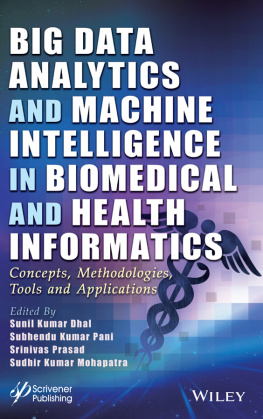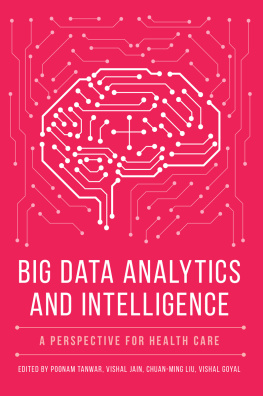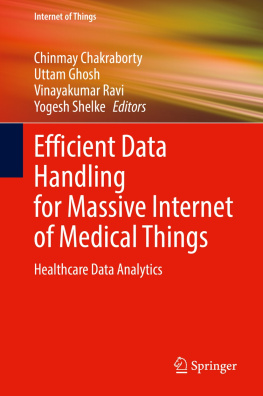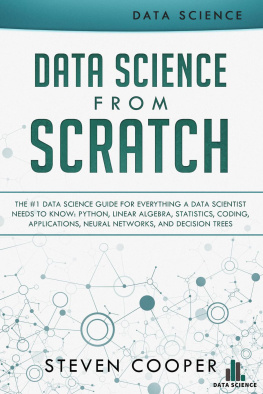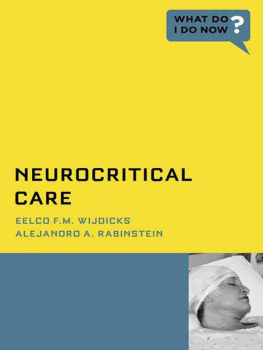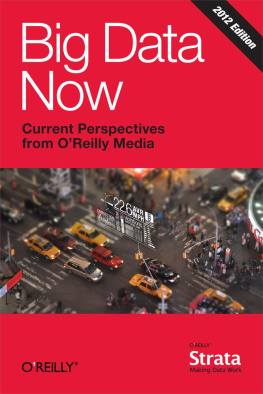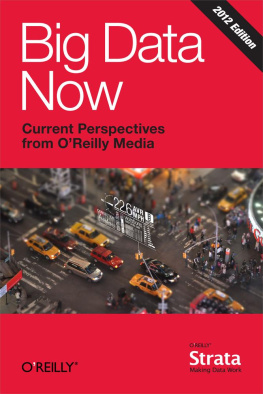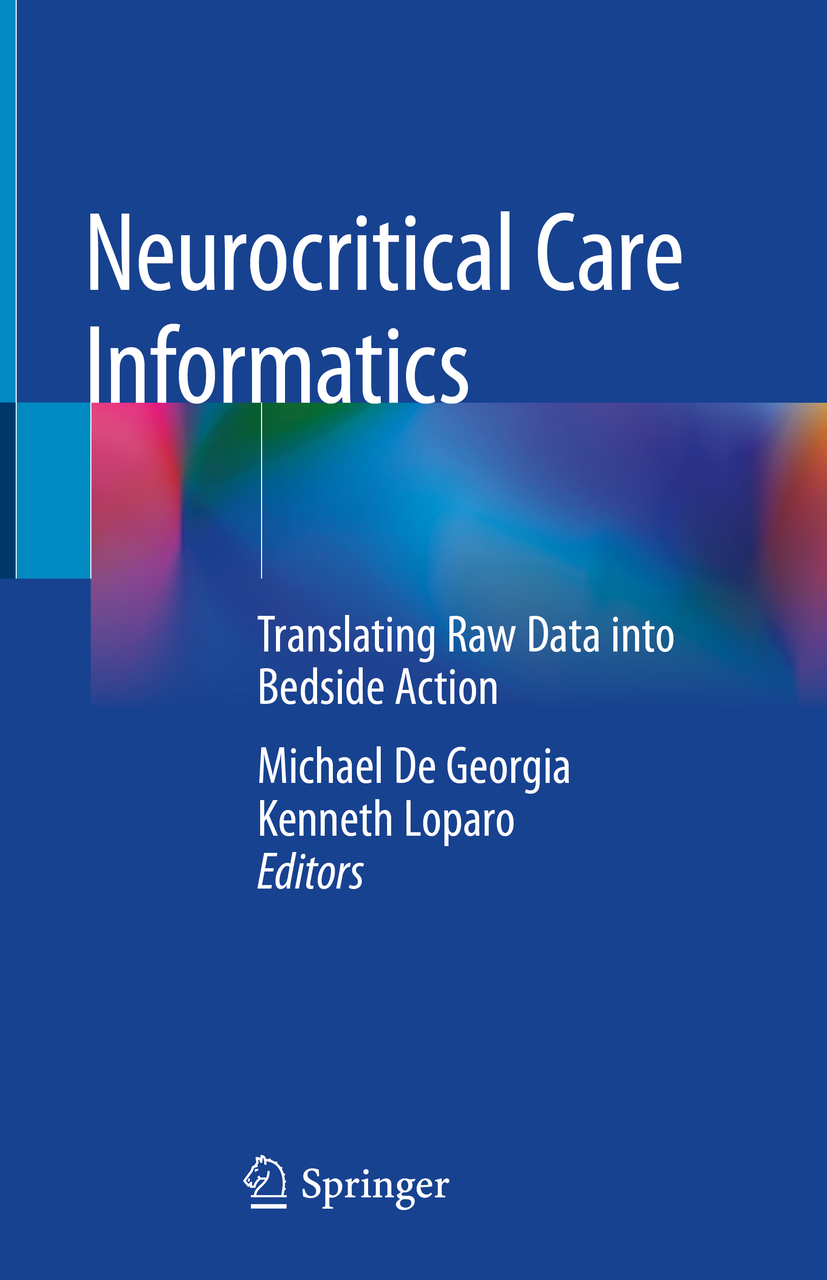Editors
Michael De Georgia
University Hospitals Cleveland Medical Center, Cleveland, Ohio, USA
Kenneth Loparo
Case Western Reserve University, Cleveland, Ohio, USA
ISBN 978-3-662-59305-9 e-ISBN 978-3-662-59307-3
https://doi.org/10.1007/978-3-662-59307-3
Springer-Verlag GmbH Germany 2020
This work is subject to copyright. All rights are reserved by the Publisher, whether the whole or part of the material is concerned, specifically the rights of translation, reprinting, reuse of illustrations, recitation, broadcasting, reproduction on microfilms or in any other physical way, and transmission or information storage and retrieval, electronic adaptation, computer software, or by similar or dissimilar methodology now known or hereafter developed.
The use of general descriptive names, registered names, trademarks, service marks, etc. in this publication does not imply, even in the absence of a specific statement, that such names are exempt from the relevant protective laws and regulations and therefore free for general use.
The publisher, the authors, and the editors are safe to assume that the advice and information in this book are believed to be true and accurate at the date of publication. Neither the publisher nor the authors or the editors give a warranty, expressed or implied, with respect to the material contained herein or for any errors or omissions that may have been made. The publisher remains neutral with regard to jurisdictional claims in published maps and institutional affiliations.
This Springer imprint is published by the registered company Springer-Verlag GmbH, DE part of Springer Nature.
The registered company address is: Heidelberger Platz 3, 14197 Berlin, Germany
Preface
Big data. If there is any phrase that has captured the imagination of the public in the last ten years, it is this. The idea of harnessing large data sets and using sophisticated processing techniques to extract hidden information is powerful. From the Human Genome Project, which took more than a decade to analyze more than 3 billion base pairs (that now can be done in a week), to Facebook, home to some 40 billion photos, to Wal-Mart, which handles more than a million customer transactions an hour, big data is changing the way the world operates.
Big data will also change medicine. Nowhere will this be more important to patient care and outcomes than in the intensive care unit (ICU). Critical care (especially neurocritical care) is by nature data-intensive and involves highly complex decision-making. Despite the growth of critical care, however, the basic approach of information management has remained largely unchanged over the past 40 years. Large volumes of data are collected from disparate sources and typically reviewed individually and retrospectively. Even that is difficult. Providers must navigate through a jungle of monitors, screens, software applications, and often supplemental paper charts inherent in todays cacophony of information systems. Acquiring and storing data from patient monitors and medical devices at the bedside is challenging. There is limited medical device interoperability and integration with the electronic medical record remains incomplete at best and cumbersome.
Even when data can be viewed in real time, standard analytical approaches provide little insight into a patients actual pathophysiologic state. Understanding the dynamics of critical illness requires precisely time-stamped physiologic data (sampled frequently enough to accurately recreate the physiologic waveforms at the correct level of granularity) integrated with clinical context. Data processing in the ICU today is essentially nonexistent beyond plotting a trend line. Making sense of the rapidly evolving complexity of critical illness requires a wide array of linear and nonlinear analytical tools and ultimately the application of artificial intelligence, machine learning, and deep learning techniques.
All of this is far beyond the capability of todays ICU. This book outlines a roadmap of how we can get there: (1) an integrated critical care informatics architecture that facilitates acquisition , s ynchronization , integration , and storage of all relevant patient data into a searchable database; (2) high level data processing to extract clinically relevant features from raw data and translate them into actionable information; and (3) intuitive data visualization and clinical decision support to effectively disseminate this information and help providers deliver the best possible care. Advances in technology and the emerging field of medical informatics are beginning to bring all of this together.
We believe this will fundamentally transform medicine in ways that we have only begun to imagine.
Michael De Georgia
Kenneth Loparo
Cleveland, OH Cleveland, OH
Contents
Michael De Georgia , Farhad Kaffashi , Frank J. Jacono and Kenneth Loparo
Richard Moberg , Christopher G. Wilson and Ryan Goldstein
Paul M. Vespa
Amedeo Merenda , Michael De Georgia and J. Claude Hemphill III
Naiara Garcia-Losarcos , Aditya Vuppala and Kenneth Loparo
Jaspreet Kaur Mann , Farhad Kaffashi , Benjamin Vandendriessche , Frank J. Jacono and Kenneth Loparo
J. Michael Schmidt , John M. Irvine and Sarah Miller
Vitaly Herasevich , Mikhail Dziadzko and Brian W. Pickering
Soojin Park and Michelle L. Rogers



